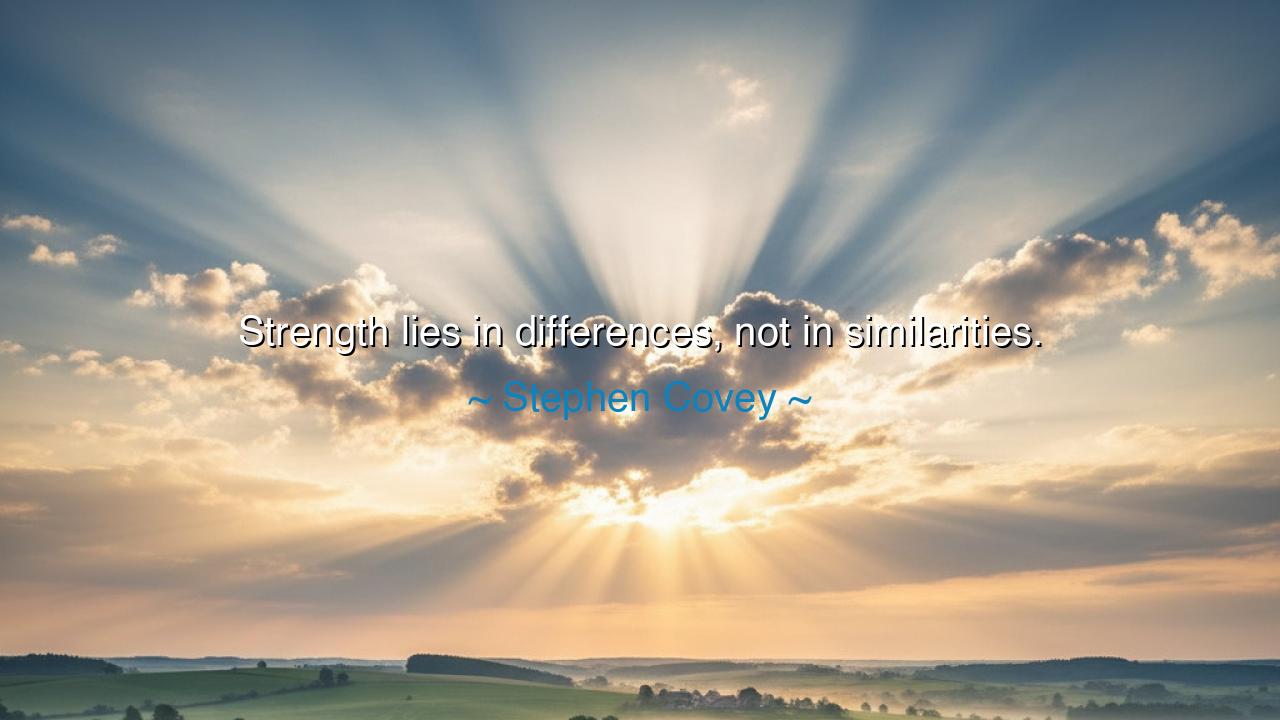
Strength lies in differences, not in similarities.






In the words of Stephen Covey, teacher of leadership and steward of wisdom, we are given a truth that is as old as the human race itself: “Strength lies in differences, not in similarities.” These words are a lantern for our times, and for all times, reminding us that greatness is not forged in the monotony of sameness, but in the harmony of diversity. For a chorus is powerful not because every voice is alike, but because many voices, each distinct, rise together into one resounding song.
The heart of this saying is that differences are not weaknesses to be feared, but treasures to be cherished. When people are alike in thought, skill, or perspective, their vision is narrow, their strength limited. But when people bring different gifts—one with wisdom, another with courage, another with creativity, another with endurance—then together they are unbreakable. Just as a body is not made of one organ alone but many, so too is a community or a nation strengthened not by sameness, but by the blending of its unique parts.
The ancients knew this truth well. Consider the armies of Rome, which drew soldiers from many nations—Gauls, Spaniards, Africans, Greeks—each with their own ways of fighting, each with their own traditions of strength. Rome bound them into one legion, and through their differences, they built an empire that endured for centuries. The legion was not strong because its men were identical, but because its differences were ordered and united in purpose.
History gives us another example in the founding of the United States. Thirteen colonies, each distinct, each jealous of its independence, came together in common cause. Their cultures, economies, and traditions differed greatly, yet these differences became their strength. The industrious North, the agrarian South, the seafaring East—when joined together—formed a power that could withstand the might of the British crown. Had they clung only to similarity, their effort would have fractured; it was their unity in difference that gave them victory.
Covey’s words also carry a deeper meaning for the soul. Within each person there are many parts—reason and emotion, discipline and spontaneity, caution and daring. It is not by silencing one part that a man or woman becomes whole, but by harmonizing their inner differences. Strength of character comes from accepting the full self, not from crushing it into uniformity. To live divided within is weakness; to live integrated is power.
The lesson for us is clear: do not fear difference, whether within yourself or among others. See in it the raw material of strength. In your family, your community, your workplace, your nation—seek out those who are not like you. Learn from them. Combine your gifts. For where all are the same, there can be no growth; but where differences abound, there is the potential for greatness beyond imagination.
Practically, this means practicing both humility and openness. Surround yourself with people who challenge you, who think differently, who bring to the table what you do not have. In times of conflict, remember that disagreement is not a curse but an opportunity to forge something stronger. And within yourself, do not despise the parts that seem at odds—your tenderness alongside your strength, your caution alongside your daring—for together they form the wholeness of your humanity.
So let us remember Stephen Covey’s wisdom: strength lies in differences, not in similarities. A world of sameness is brittle and fragile, but a world of diversity is strong and enduring. Embrace it in your communities, cherish it in your families, cultivate it in yourself. For just as the strongest rope is woven of many strands, so too the strongest life, the strongest people, and the strongest nations are those that find power in the harmony of their differences.






AAdministratorAdministrator
Welcome, honored guests. Please leave a comment, we will respond soon